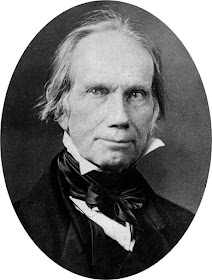 |
| Henry Clay |
He was born in 1777 to a Virginia planter and slave owner. His father died when he was only four-years-old, and shortly thereafter the British raided the family home. His mother ultimately married Henry Watkins who, in 1891, moved the family to Kentucky in search of a better fortune. It as here where he became a lawyer and, in 1799, married into a wealthy family.
Clay was a great speaker and gained great respect as a lawyer. This was enhanced by the fact that family members helped him to obtain influential and wealthy clients. This helped him to gain new clients and to improve upon his stature as lawyer. By 1805 he was a teacher at Transylvania University, and by 1812 he owned 600 acres of land where his main crops were tobacco and hemp. He also owned saves who did much of the work.
By 1803, at the young age of 26 (and too young to be elected to the office), Clay was appointed as representative to Fayette County. His age was left off any documents, and no one seemed to notice. By 1807, he was Speaker of the Kentucky State House of Representatives. He was so effective that, in 1811, he was elected as a U.S. Representative from Kentucky. He was also appointed twice to the Kentucky State Senate.
It should be noted here that, as was the case for most Kentuckians at the time, that he was a member of the democratic-republican party.
In 1811, he was elected to the U.S. House of Representatives. On the very first day of his first session of Congress, he would be chosen by his peers to become the Speaker of the House. Other than the first ever session of Congress after the signing of the Constitution, he was the only person ever to accomplish this feat. He would go on to be re-elected as Speaker of the House five times, serving a little over ten years, which was longer than any other Speaker prior to the Civil War.
In 1824, he made his first bid to become President of the United States. He received 37 electoral votes and 13% of the popular vote. Andrew Jackson received the most electoral votes with 99 and he also received a majority of the popular vote at 41.4%. However, John Quincy Adams was able to muster 84 electoral votes and 30.9% of the popular vote, and William H. Crawford was able to muster 41 electoral votes and 11.2% of the electoral college. Because no candidate won a majority of the vote, the election was handed over to the House of Representatives.
John C. Calhoun was also in the running for President, although he would decide to drop out and run for Vice President in stead. He was the clear winner of this job. So, the question now became: which candidate would the House choose to become President?
At first it was considered that Jackson, who won a majority of the popular vote and the most electoral votes, would be the likely choice. However, this would not be the case.
Consider here that the Federalist party was long dead by this time, and the main party was the democratic-republican party. So, as the only party, it would control politics for quite a few years. However, by 1828, there was quite a bit of opposition within the party. This came to a head as a result of a compromise that was spearheaded by Clay in 1824.
At this time, the 12th Amendment stated that if no candidate for President obtained a majority, that the top three candidates would be considered for President by the House. Even though he was the fourth candidate, he was still the Speaker of the House. This left him with a lot of sway on House members.
Keep in mind here that Clay hated Jackson. So, he threw his support behind Adams with the belief that this would sway fellow members of the House to also support Adams. In return, Clay wanted Adams to name him as his Secretary of State. Clay figured this would work out great for him not just because he hated Jackson, but because, at this time, the Secretary of State job often set up a person nicely to becoming a future President.
This "back-room deal" angered the Jackson faction of the democratic-republican party. Jackson campaigned hard on this deal until the two men (Adams and Jackson) squared off in the 1828 election. This time around Jackson won in convincing fashion. So, in a sense, you could say that this "back-room deal" back fired on both Adams and Clay.
The incident would ultimately lead to such division within the democratic-republican. Adam's followers formed the National Republican party (which was essentially the anti-Jackson wing of the democratic-republican party), and Jackson's followers continued on as the Democratic Republican party. Clay was a leader of this party. When Jackson defeated Adams in 1928, this lead to the formation of the Whig Party.
The Whig Party as mainly formed of members of the democratic-republican party (of which almost everyone was at this time) who despised Jackson's authoritarian methods of running the presidency. Clay would lead the charge, and would become one of the initial members of the Whig Party.
Further reading and references:

ReplyDeleteI started on COPD Herbal treatment from Ultimate Health Home, the treatment worked incredibly for my lungs condition. I used the herbal treatment for almost 4 months, it reversed my COPD. My severe shortness of breath, dry cough, chest tightness gradually disappeared. Reach Ultimate Health Home via their website www.ultimatelifeclinic.com . I can breath much better and It feels comfortable!